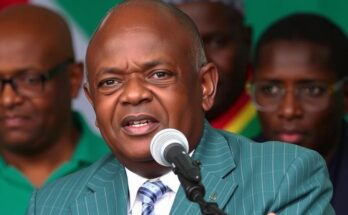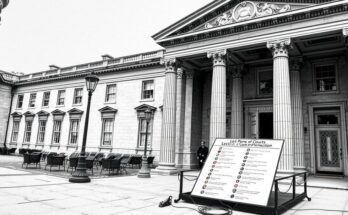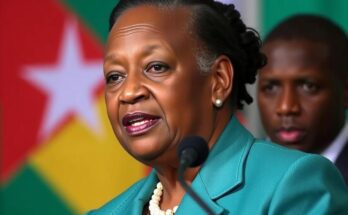Namibia has extended its election voting period into the weekend due to ballot shortages, inciting complaints from opposition parties alleging fraud. Voter frustrations are mounting as many experience long delays and logistical problems. This situation underscores broader regional issues of political dissatisfaction among youth, despite Namibia’s history of credible elections.
Namibia’s electoral agency has announced an extension of the voting period for presidential and parliamentary elections due to ballot paper shortages and technical difficulties. Originally set to conclude on Wednesday, polling will now continue until Saturday evening. This decision has sparked allegations of fraud from the opposition, particularly the Independent Patriots for Change party, which deems the extension illegal. Many voters reported significant delays and logistical problems at polling stations, with some unable to vote since the original start date, causing frustration and uncertainty among the electorate.
The extension of voting coincides with broader concerns in southern Africa, where political unrest is evident, particularly in Mozambique, following allegations of election fraud. Namibia’s electoral process is particularly significant as vice president Netumbo Nandi-Ndaitwah seeks to become the country’s first female president, amid a youth population increasingly discontented with economic conditions despite the nation’s upper-middle-income status. The elections, crucial for determining the country’s political leadership, have witnessed historical credibility, but current frustrations may challenge this legacy. Many voters expressed their challenges openly, highlighting the urgency for electoral improvements.
Namibia, having been a German colony before becoming a South African territory post-World War I, has had a tumultuous history, leading to its independence in 1990 largely due to the efforts of the SWAPO party, which has been in power since then. Despite previous elections being viewed as credible and stable, the current situation reflects significant public dissatisfaction, particularly among the youth facing unemployment and economic strife. The extension of the electoral process due to logistical issues may undermine public trust in the elections. Additionally, it showcases a broader regional trend where citizens are increasingly critical of long-standing political parties that previously liberated them from colonial rule.
The extension of the electoral period in Namibia due to technical issues has led to significant public outcry, particularly from opposition parties who perceive it as a threat to democratic integrity. As the nation seeks to consolidate its political future through these elections, the unfolding situation highlights deep-seated frustrations within the populace regarding economic challenges and governance. The electoral commission must address logistical failures to maintain the credibility of its democratic processes.
Original Source: abcnews.go.com




